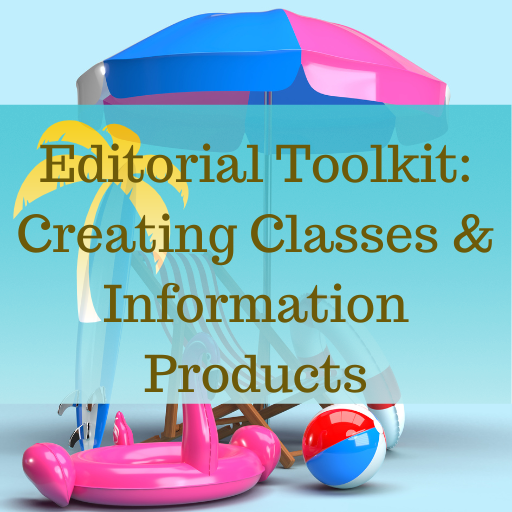What topic should your information product cover?
You’ve probably heard that to get people to sign up for your newsletter list, you should create an information product of some sort (an ebook, a white paper, a collection of templates) to give away in return for their signing up for your newsletter.
This is certainly a tried-and-true strategy (and I do it myself on Club Ed) but that’s not the only use for an information product. I recommend offering a low-cost information product as a way for people to get to know you a little better before investing in the (much) bigger expense of hiring you to do an edit.
Asking potential clients (in this case, indie authors) to pay a small fee ($10 or $20) is a way of separating the people who are never going to pay you to edit their work from those who might. Once they’ve made this initial investment, they’re more likely to think about you when they’re ready to hire an editor.
To create an information product people will buy, start by paying attention to the kinds of things potential clients already ask about. If you don’t have anyone who emails you with questions, then hang around a writers’ group (such as on Facebook) for a while and see what kinds of questions crop up over and over. Pick a group that aligns with your desired audience/clientele.
These may be craft questions (“how do I write an action scene? I’m struggling”) or editing-related questions (“Should I hire a copy editor or a developmental editor?” and “Where do I find a beta reader?”) or publishing-related questions (“Do you know any good cover designers?”)
Think about where your particular expertise lies and connect that with the questions. If you’re a person who collects resources, then sell access to your list. If you know all about writing action scenes, sell your ebook on that. If you know a few secrets to self-publishing that will save writers a lot of headaches, sell that.
Not only does a low-cost information product add a few dollars to your pocket and can potentially convert a maybe client to an actual client, it can be used to gauge interest in other (more expensive!) products. So if your ebook on writing action scenes gets a lot of buyers then maybe you should teach a class on writing action scenes, giving feedback on authors’ work.
Now they’re even more invested in you and they’ve gotten a taste of what your editing is like. This makes it even more likely that they’ll hire you when it’s time to hire an editor for their book. Again, you earn a few bucks and you book a few clients – that’s a pretty good result for an effort that doesn’t have to take up a ton of your time!
Join the Club!
New to story editing? Begin at the beginning.




